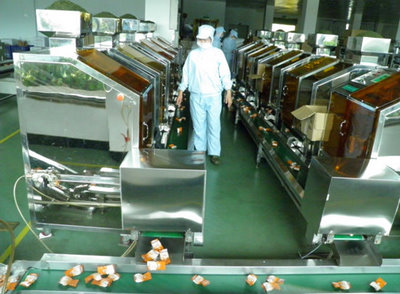
Translated by Andrew Vanburen from a recent Qiu Guogen speech in Shanghai
YUAN BILLIONAIRE QIU GUOGEN, founder of hedge fund Shanghai Chongyang Investment, is often likened to his US peer, John Paulson, who made a name for himself, more or less, during the US subprime meltdown.
Qiu believes that Beijing will do its utmost to protect two critical sectors – property and manufacturing – and thus the country will likely avoid a dreaded hard landing.
First, a bit about “China’s John Paulson.”
Qiu's fund has been ranked China's Top Hedge Fund by RisingFund. The 43-year old Zhejiang native has a net worth of 320 mln usd.
He made news recently when he and his fund’s jewelry magnate partner announced plans to sell their 10 mln shares held in domestic brokerage Guotai Junan Securities on the Shanghai United Assets and Equity Exchange for 13 yuan per share to “further improve asset structure,” Shanghai Chongyang Investment said at the time.
The funds from the share sale could very well be re-invested in the consumer products sector which, the hedge fund believes, look promising over the long term, Shanghai Chongyang added.
Qiu founded Shanghai Chongyang, a leading private money manager in the PRC, with Li Xuli, former CIO with Schroders China JV.
Qiu has over 20 years experience in the securities investment world.
He launched his career back in the 1990s in China’s JunAn Securities, a leading investment bank, and went on to establish Shanghai Chongyang Investment in 2001, focusing on long-term equity investment.
Besides on-the-job education, Qiu has a Master’s Degree in economics from Renmin University in Beijing.
According to China.org.cn, he was the 42nd richest Shanghai resident this year, while Forbes said he went from being China’s No.328 to No.353 and then up to No.325, respectively, between 2008 and 2010, thus straddling the worst of the global meltdown with no drastic fluctuation in his national ranking.
Many investors look to him and his opinions and/or investment decisions for where the economy and capital markets may be headed.
He asserts that in today’s topsy-turvy market, there are striking differences between opportunities and pitfalls, and with a bit of training, we can all come to recognize them at the outset for what they are.
In a recent strategic investment speech in Shanghai, he shared his views on three of the most important events in today’s market.

First, he had full faith that central government economic regulators would bend over backwards to support the two pillar industries of real estate development and traditional manufacturing so that a soft landing could be manufactured.
He added that if Beijing were to step aside and let things take their natural course, a hard landing would almost certainly be the undesirable outcome as investments would not gravitate toward these sectors without some carrots from the capital.
Second, he was in line with most economists and pundits by believing that liquidity will remain constrained and tight in the near term.
Finally, casting his gaze overseas, he saw no near term turnaround in the sovereign debt crises wracking Europe at the time, and in fact believed that things would get much worse there before they began taking a turn for the better.
“I am very happy to speak to you all today about strategic thinking in the market, but I speak to you with somewhat of a heavy heart because this year has been a money-losing one for me,” Qiu thus began his presentation.
“For investors to realize a good composite growth rate in the current market, it is impossible to be completely shielded from fluctuations. Our goal should be to control exposure to downswings as much as possible while remembering our ultimate goal is to win good yields. All of us are inevitably spending more time doing our best to fully research and adjust our existing and target portfolios and my job here today is to share with you my latest systematic strategies for adjustment in this volatile equity market we find ourselves in.
“Shanghai Chongyang Investment’s strategy for this year has been widely published and I won’t reiterate here verbatim for fear of tiring you. What I want to talk about today is related, but with some important updates, adjustments and perspectives that I hope will be more useful to you all in a focused way.
“For those with even a finger in the market, 2011 has been both a complex and a somewhat confounding year. In the first half, the two year-old ChiNext fell a staggering 26.8% from a year earlier, yet from July until today, the same board gained back over 5%. Meanwhile, the Shanghai and Shenzhen 300 Index outperformed ChiNext by 21%, but since then it has underperformed “China’s Nasdaq” by 18%. As you can see, the first half and the second half are like apples and oranges, and trends in the market between the two periods are impossible to link together in any logical way.

“You will recall that back in February and March, all the economists seemed to be predicting that inflation would ease at the end of the first quarter or the beginning of the second. At the time, the EU debt meltdowns were still simmering at room temperature, and the Green Revolution that was to sweep across North Africa and affect Tunisia, Egypt and eventually lead to the death of Libya’s leader had not yet been unleashed in full force.
"In fact, inflation in the second half of this year far exceeded original expectations as banks around the world loosened credit to stimulate growth which helped fuel even more price rises. Meanwhile, the domino-like austerity measures implemented across Europe revealed the true depth and severity of the financial crisis brewing there.
"Despite all these unforeseen events and unsettling developments -- all of which were missed by me in large part and I am sure many of you are nodding your heads in agreement -- there are some 'certainties', if one dare to use that word in such a market.
"Given Beijing's strong dislike for runaway inflation and employment instability, it is safe to say that the central government will do its best to shield both property developers and manufacturers from anything approaching a hard landing.
"Second, given the just mentioned dislike of overly fast jumps in the CPI, especially more sensitive staples within the pricing basket, I don't see too much over the near term in the way of a major credit loosening.
"Lastly, if history is any teacher, then the sovereign debt crises that are spreading like wildfire across the European continent will likely take more time to burn out before the healing can begin."
Mr. Qiu concluded by saying that his fund would make decisions going forward based on these general forecasts, and hoped that investors would also keep them in mind when deciding where to put their money in this volatile environment.
See also:
Veteran Fund Manager: "The Best Opportunities In A Half-Century"
Europe – Finally, Light At The End Of The Tunnel?
